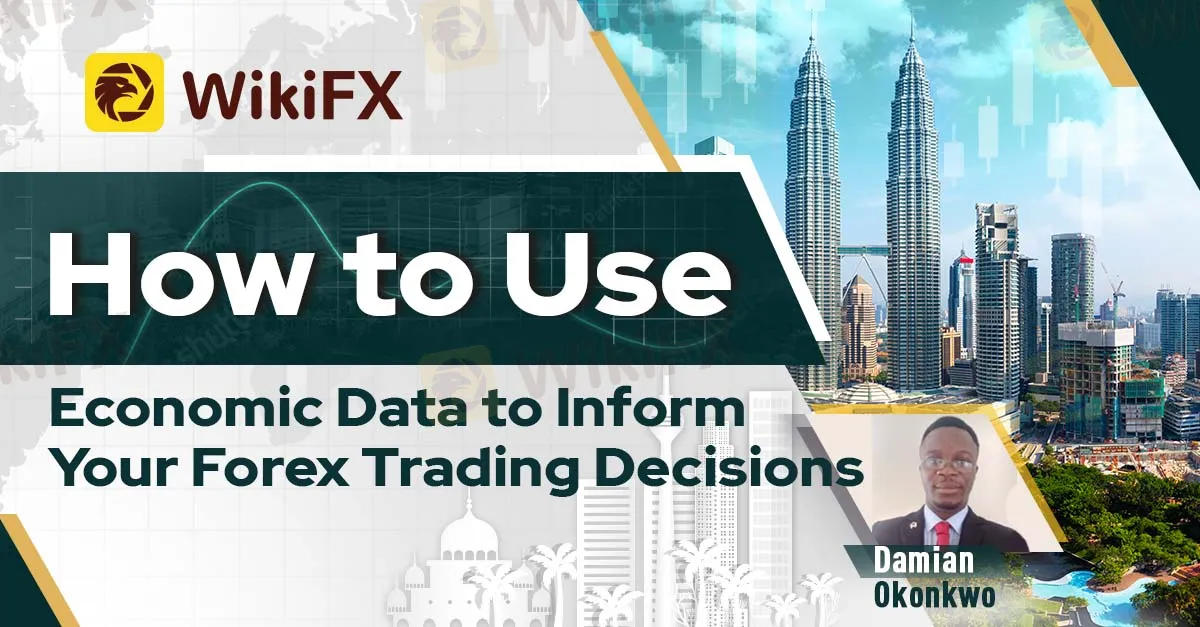简体中文
繁體中文
English
Pусский
日本語
ภาษาไทย
Tiếng Việt
Bahasa Indonesia
Español
हिन्दी
Filippiiniläinen
Français
Deutsch
Português
Türkçe
한국어
العربية
How to Use Economic Data to Inform Your Forex Trading Decisions
Abstract:While technical analysis can provide valuable insights, it's crucial to consider the broader economic landscape and consider the economic data to make informed trading decisions.

By: Damian Okonkwo

How to Use Economic Data to Inform Your Forex Trading Decisions
In the fast-paced world of forex trading, each decision made by a trader matters so much to his positions. While technical analysis can provide valuable insights, it's crucial to consider the broader economic landscape and consider the economic data to make informed trading decisions.
Economic data encompasses a wide range of indicators, such as:
● Gross Domestic Product (GDP): Reflects the overall health of an economy.
● Interest rates: Set by central banks and influence currency valuations.
● Inflation: Measures the rate at which prices increase.
● Trade balance: This gives the disparity between a country's exports and imports statistics.
● Unemployment rate: Indicates the level of economic activity.
● Consumer confidence: Shows how optimistic consumers are about the economy.
Understanding how these indicators interact and impact different currencies is essential for successful forex trading.
Using Economic Data to Make Informed Decisions
Here's how you can use economic data to make informed trading decisions:
1. Identify key economic events:
Economic calendars are essential tools for forex traders. They provide a comprehensive overview of upcoming economic events, along with their potential impact on specific currencies. By focusing on high-impact events, such as:
● Central bank interest rate decisions: Impacting currency valuations.
● Non-farm payrolls: Providing insights into the health of the U.S. economy.
● Retail sales: Reflecting consumer spending and economic activity.
● Manufacturing indexes: Indicating the strength of a country's manufacturing sector.
● Trade balance: Influencing currency valuations based on exports and imports.
2. Analyze the data:
It's crucial to not only identify key economic events but also interpret their implications. Compare the released data to forecasts and historical data to assess the surprise factor and potential impact on the market.
For example, if a central bank raises interest rates more than expected, it could strengthen that country's currency relative to others. Conversely, a weaker-than-expected GDP report could indicate a slowing economy and potentially weaken the associated currency.
3. Align your trading strategy:
Based on your analysis of the economic data, you can adjust your trading strategy accordingly. This could involve:
● Entering long positions if you anticipate a currency strengthening.
● Entering short positions if you anticipate a currency weakening.
● Exiting existing positions if the data suggests a change in market sentiment.
● Hedging your portfolio to protect against potential losses.
4. Manage risk effectively:
Economic data can be unpredictable, so it's crucial to manage risk effectively. This includes:
● Setting stop-loss ordersto limit potential losses.
● Using position sizing to avoid overexposure to any single currency.
● Diversifying your portfolio to spread risk across different currencies and asset classes.
Conclusion
By effectively using economic data, forex traders can gain valuable insights into market movements and make informed trading decisions, ultimately increasing their chances of success in the competitive world of forex trading.

Disclaimer:
The views in this article only represent the author's personal views, and do not constitute investment advice on this platform. This platform does not guarantee the accuracy, completeness and timeliness of the information in the article, and will not be liable for any loss caused by the use of or reliance on the information in the article.
Read more

The Ultimate Guide to Automated Forex Trading in 2025
Modern markets are revolutionized by automated trading systems, which now execute 70-85% of all transactions. These advanced automated trading software solutions, commonly called trading robots or Expert Advisors (EAs), leverage algorithmic precision for automatic trading across forex, stocks, and commodities 24/7. By removing emotional interference and executing trades in microseconds, auto forex trading platforms create fair opportunities for all market participants. For those new to automated trading for beginners, these systems provide disciplined, backtested strategies while significantly reducing manual effort.

How Reliable Are AI Forex Trading Signals From Regulated Brokers?
Discover how reliable AI Forex trading signals are and why using a regulated broker boosts their effectiveness. Learn key factors to evaluate accuracy and enhance your trading.

Top Currency Pairs to Watch for Profit This Week - March 31, 2025
Discover the top 5 currency pairs to trade for profit this week, March 31, 2025—USD/JPY, EUR/USD, GBP/USD, AUD/USD, USD/CHF—with simple strategies and best times.

AI-Powered Strategies to Improve Profits in Forex Trading
Boost Forex profits with AI: predictive analytics, real-time automation, and smart risk management strategies for sharper trades and fewer losses.
WikiFX Broker
Latest News
How Crypto Trading Transforms FX and CFD Brokerage Industry
UK would not hesitate to retaliate against US tariffs - No 10 sources
FCA Warns Against 10 Unlicensed or Clone Firms
CySEC Warns Against 14 Unlicensed Investment Websites
Top Currency Pairs to Watch for Profit This Week - March 31, 2025
Will natural disasters have an impact on the forex market?
Philippines Deports 29 Indonesians Linked to Online Scam Syndicate in Manila
Navigating the Intersection of Forex Markets, AI Technology, and Fintech
Exposed: Deceptive World of Fake Trading Gurus – Don’t Get Fooled!
AI-Powered Strategies to Improve Profits in Forex Trading
Currency Calculator







